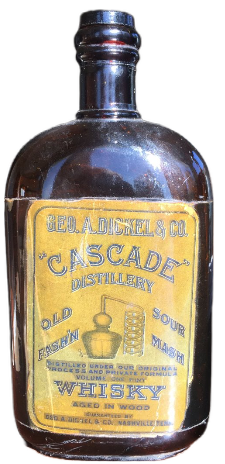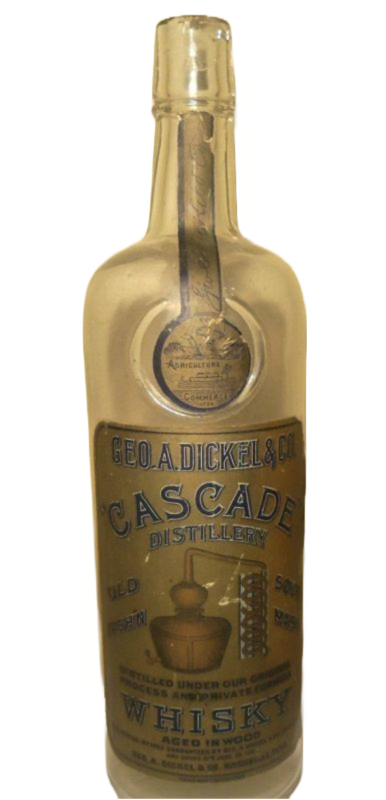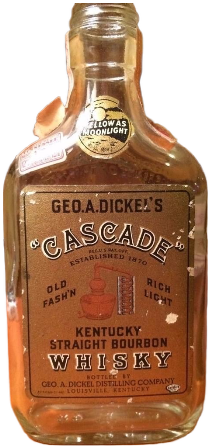George Dickel
“The Great Whiskey Dealer”
George Augustus Dickel was born on February 2, 1818. He was a German American who owned a number of businesses in Nashville, Tennessee. One of his businesses was a liquor wholesaler, which was a non-distiller producer of the Cascade brand Whiskey he originally sold and distributed. Following Tennessee’s long Prohibition, eventually, the idyllic Cascade Hollow distillery was reopened in the 1950s, where it still produces its own traditional Tennessee Whiskey.
Dickel’s mother, Elisabeth Dickel, was from Grunberg, Germany. George is believed to be the son of Anton Fischer and was named for his uncle George Adam Fischer, who was a Master Cooper specializing in wine casks. When he was 26, George emigrated to the United States, making the move to Nashville in 1847. He was working as a cobbler, making boots and shoes in Nashville, when he opened his liquor wholesaling business in 1861. It was also about this time that Dickel married fellow German-American Augusta Banzer.
Like many liquor wholesalers during the Civil War, Dickel was oft-suspected but never caught smuggling whiskey during the Union occupation of Nashville. In 1862, a Dickel associate and friend named Meier Salzkotter, who had worked with Dickel since 1859, and who was the son-in-law of Abram Schwab (the same Schwab family who was later in the investment business), was apprehended by the Union with contraband liquor. Salzkotter defended himself by claiming his in-laws had forced the whiskey on him, but he was jailed anyway. When he was finally released, Salzkotter divorced his wife, Cecilia Schwab.
After the Civil War concluded in 1865, Dickel opened a liquor store on busy South Market Street in Nashville. Salzkotter was hired as a superintendent, and Victor Emmanuel Shwab, who had by then removed the ‘c’ from his surname, was his bookkeeper. Shwab soon married Emma Banzer, one of Augusta Dickel’s sisters and George Dickel’s sister-in-law..
In 1866, Dickel was arrested and charged with illegally rectifying liquor without a license, but his business continued to thrive. In 1870, now out of jail, he established the George A. Dickel and Company, headquartered at 2 North Market Street, Nashville. As a liquor wholesaler/rectifier, Dickel would purchase whiskey from various distillers around the region, blend and sell it, most often by the entire barrel. At that time, if a customer wanted a bottle or a jug of whiskey, he often had to bring his own container to the rectifier for filling.
George A. Dickel and Company also sold beer produced by Stifle and Pheiffer of South Nashville, as well as wines and brandy. It was also the first establishment in the U.S. to legally import Scotch and Irish Whiskey, Champagne, and Dutch Gin. According to documents from as far back as 1875, the company sold and shipped these liquors nationwide. Newspapers at the time referred to Dickel as “The Great Whiskey Dealer.”
On March 17, 1874, a fire destroyed the Dickel and Company headquarters and just missed the enormous warehouse filled with Dickel’s valuable and extremely flammable whiskey. After rebuilding, in May 1881, the warehouse was again destroyed by a fire. In 1882, Dickel and Company constructed yet another new five-story headquarters, this time on Second Avenue, and this time it was never destroyed yet in fact, it still stands today.
Taking a shine to the Tullahoma area during a 1870 hunting trip, Dickel started building a distillery, which he named Cascade Hollow. In 1883, McLin Davis was appointed the first distiller of Cascade Hollow, and Davis was able to institute innovations that greatly improved the whiskey. Davis is also credited with the original recipe for the whiskey. Victor Shwab, George Dickel’s brother-in-law, who had been made a full partner in Dickel and Company in 1881, bought out his rival partner in 1888, and by doing so held 2/3 ownership of the distillery. By that time, Dickel and Company was Cascade Hollow’s exclusive marketer and distributor, and their product was called George A Dickel’s Cascade Tennessee Whiskey. The tagline for the whiskey, which is still used occasionally, "Mellow as Moonlight”, was based on the fact that the method of cooling the mash was done by the cool of the night, a method which was also instituted by the resourceful and imaginative Davis.
Despite being quite wealthy for the time, Dickel, though by now retired to a life of relative ease in Nashville, was also a volunteer firefighter with the Deluge Company No. 3. He and Augusta lived in a large, stately home on nearby Dickerson Pike. The property contained a well-known and picturesque pear orchard.
In 1852, Dickel was made a Master Mason and also a Knights Templar. Though never particularly politically active, Dickel supported fellow German-American photographer Carl Giers for the state legislature in 1874.
Dickel was injured badly after a horse riding accident in 1886, and his health declined rapidly after that. On June 11, 1894, George A. Dickel passed away at the age of 76; he was interred at Mount Olivet Cemetery in Nashville.
As Dickel’s health was declining, Shwab had begun to take over Dickel and Company operations. In his will, Dickel left his portion of the company to Augusta and asked her to sell when she was able to, but she decided instead to keep the company, though she was not active in its operations. A rich widow, Augusta spent the rest of her life traveling, purchased a home on Lake Michigan, and took yearly trips to Europe. When Augusta died in 1916, Shwab received her share of the company. Schenley Industries then bought the Cascade brand from the Shwab family in 1937.
During the early 1900s, the distillery expanded as the demand for Cascade Hollow continued to grow. Unfortunately, Prohibition soon came to Tennessee, and in 1910, distilleries were given 12 months to move or cease operations. Victor Shwab formed an agreement with Arthur Philip Stitzel to continue production of Cascade Hollow whiskey in Kentucky for a while, and paid extra for charcoal mellowing to be done at the Stitzel distillery in order to remain true to the Lincoln County process. Unfortunately, Prohibition eventually came to that state as well, ending whiskey production of Cascade whiskey until the 1950s when the distillery was revived as The George A. Dickel Distilling Company, which is as it remains today. In 1997, George A. Dickel Distilling was then purchased wholly by spirits behemoth Diageo.
Contributed by Daniel Snyder, Champaign, Illinois
George Dickel Historical Bottles
George Dickel’s Cascade Whiskey, “Mellow as Moonlight”









